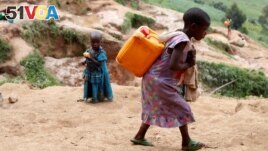Half of the world's 75 poorest countries are getting poorer compared to the richest economies.
与最富有的经济体相比,世界上75个最贫穷的国家中有一半正在变得更穷。
That finding comes from the World Bank. The development agency based in Washington, D.C., recently released a report on the least developed nations. It said that the difference in income growth per person in the poorest countries and the richest has widened over the past five years. It is the first time the difference has increased since the beginning of the 2000s.
这一发现来自世界银行。这家总部设在华盛顿特区的发展机构最近发布了一份关于最不发达国家的报告。报告称,在过去五年中,最贫穷国家和最富裕国家的人均收入增长的差距有所扩大。这是自21世纪初以来,这种差距首次扩大。
Ayhan Kose is Deputy Chief Economist of the World Bank and one of the writers of the report. He told Reuters, "For the first time, we see there is no convergence. They're getting poorer."
阿伊汗·高斯是世界银行副首席经济学家,也是该报告的作者之一。他告诉路透社,“我们第一次看到差距没有缩小。他们越来越穷。”
He said the report writers saw "a very serious structural regression." Kose said that is why the report is bringing attention to it.
他说,报告作者看到了“非常严重的结构性倒退”。高斯说,这就是报告引起人们关注的原因。
The writers studied the 75 countries that can receive financial aid and zero-interest loans from the World Bank's International Development Association (IDA). The report said the nations risk losing 10 years of development without changes in policy and a lot of international aid.
作者研究了这75个可以从世界银行国际开发协会(IDA)获得财政援助和零利率贷款的国家。报告说,如果不改变政策和增加大量国际援助,这些国家可能会失去10年的发展。
Kose said growth in many IDA countries had already begun to slow before the COVID-19 pandemic. But it was just 3.4 percent in 2020-2024. That is the weakest five years of growth since the early 1990s.
高斯表示,在新冠肺炎大流行之前,许多IDA成员国的增长已经开始放缓。但在2020-2024年,其经济增长率仅为3.4%。这是自20世纪90年代初以来经济增长最疲软的五年。
The report blamed Russia's invasion of Ukraine, climate change, and increases in violence and conflict as the main influences on the countries' development.
该报告指责俄罗斯入侵乌克兰、气候变化以及暴力和冲突的增加给这些国家发展造成重要影响。
More than half of all IDA countries are in Sub-Saharan Africa, or Africa south of the Sahara Desert. Fourteen are in the Asia Pacific area and eight are in Latin America and the Caribbean area. Thirty-one have per person incomes of less than $1,315 a year. Those countries include the Democratic Republic of Congo, Afghanistan, and Haiti.
IDA一半以上的成员国位于撒哈拉以南非洲。14个在亚太地区,8个在拉丁美洲和加勒比地区。有31个国家的人均年收入低于1315美元。这些国家包括刚果民主共和国、阿富汗和海地。
One in three IDA countries is poorer now than they were at the beginning of the pandemic. IDA countries make up 92 percent of the world's people who lack enough affordable, nutritious food.
三分之一的IDA成员国现在比疫情开始时更穷。在全球缺乏足够可负担营养食品的人口中,IDA成员国占到了92%。
Additionally, half of the countries are in debt distress. That means they are either unable to pay their debt or are at high risk of failing to make payments.
此外,有一半的国家处于债务困境。这意味着他们要么无力偿还债务,要么面临无法还款的高风险。
These countries have some resources. Many are rich in natural resources and have the possibility of solar energy. They also have young populations at a time when populations are aging in developed countries. However, private and government creditors have been less willing to loan these countries money.
这些国家有一些资源。许多国家拥有丰富的自然资源,有太阳能发展潜力。在发达国家人口老龄化之际,这些国家的人口也很年轻。然而,民间和政府债权人不太愿意向这些国家贷款。
U.S. Treasury Undersecretary Jay Shambaugh discussed the situation recently. He warned that China and other emerging official creditors are gaining by reducing loans to low-income countries as the International Monetary Fund and development banks are making money available.
美国财政部副部长杰伊·尚博最近讨论了这一情况。他警告说,随着国际货币基金组织和开发银行提供资金,中国和其他新兴官方债权人正在通过减少对低收入国家的贷款而获益。
He said that almost 40 countries saw more money leaving the country to pay debt than coming in as new loans in 2022. And he said that situation likely increased in 2023.
他说,2022年,近40个国家出现资金流出该国偿还债务额超过了新贷款流入额的情况。他说,这种情况在2023年可能有所增加。
Kose called for ambitious policies to increase investment. He urged countries to make policy improvements to strengthen their financial systems. He also added that countries should make structural changes to improve education and increase income.
高斯呼吁制定雄心勃勃的政策来增加投资。他敦促各国改进政策,加强金融体系。他还补充说,各国应进行结构性改革,以改善教育和增加收入。
Kose also called for financial support from the world community to lower the risk of limited economic growth. He noted that the World Bank hoped rich countries will increase financial support for the IDA by December.
高斯还呼吁国际社会提供财政支持,以降低经济增长受限的风险。他指出,世界银行希望富裕国家在12月前增加对国际开发协会的财政支持。
The report added that stronger international efforts on climate change, debt restructuring, and measures supporting international trade remained important.
报告补充说,在气候变化、债务重组和促进国际贸易措施方面加强国际努力仍然很重要。
Indermit Gill is Chief Economist of the World Bank. He noted that China, India, and South Korea had once been among the world's poorest countries. He said they were able to deal with poverty and raise living standards. Those countries are now among the world's strongest economies.
英德米特·吉尔是世界银行首席经济学家。他指出,中国、印度和韩国曾经是世界上最贫穷的国家之一。他说,他们能够解决贫困问题,提高生活水平。这些国家现在是世界上最强大的经济体之一。
He said, "The world cannot afford to turn its back on IDA countries."
他说:“世界不能抛弃IDA成员国。”
I'm Gena Bennett.
我是吉娜·贝内特。
And I'm Gregory Stachel.
我是格雷戈里·斯塔切尔。(51VOA.COM原创翻译,请勿转载,违者必究!)












